Have you ever experienced that eerie feeling when something new feels strangely familiar? You may have just encountered déjà vu! That sensation of "already seen" has puzzled scientists for years. Some think it's a connection to past lives, while others believe it's a glitch in the Matrix.
What is Déjà Vu?
Déjà vu is a French term that means "already seen." It is the feeling that you have already experienced something, even though you know that you have not. It is a very common experience, affecting about 60% of people at some point in their lives.
The scientific explanation for déjà vu is still not fully understood, but there are a number of theories. One theory is that déjà vu is a memory phenomenon. When we experience something new, our brain tries to store it in our memory. However, sometimes the brain may make a mistake and store the new experience as a memory of something that actually happened in the past. This can lead to the feeling of déjà vu.
Another theory is that déjà vu is caused by a glitch in the brain's temporal lobe. The temporal lobe is responsible for processing memories and emotions. A glitch in this area of the brain could lead to the feeling of déjà vu.
There have been a number of experiments conducted to try to understand déjà vu. One experiment, conducted by researchers at the University of California, San Diego, used virtual reality to create a situation where participants experienced déjà vu. The participants were placed in a virtual environment that was similar to one that they had previously experienced in real life. This led to the participants experiencing déjà vu.
Another experiment, conducted by researchers at the University of London, used functional magnetic resonance imaging (fMRI) to scan the brains of participants as they experienced déjà vu. The researchers found that the hippocampus, a part of the brain that is involved in memory, was activated during déjà vu.
These experiments suggest that déjà vu is a real phenomenon that is caused by a malfunction in the brain's memory system. However, more research is needed to fully understand this mysterious experience.
Here are some of the experiments that have been conducted to study déjà vu:
- In 1987, researchers at the University of California, Irvine, conducted an experiment where they showed participants a series of images. Some of the images were new, while others were repeats of images that the participants had seen earlier. The researchers found that participants were more likely to experience déjà vu when they saw a repeat image.
- In 2005, researchers at the University of Toronto conducted an experiment where they showed participants a series of words. Some of the words were real, while others were made-up. The researchers found that participants were more likely to experience déjà vu when they saw a made-up word.
- In 2011, researchers at the University of California, San Diego, conducted an experiment where they used virtual reality to create a situation where participants experienced déjà vu. The participants were placed in a virtual environment that was similar to one that they had previously experienced in real life. This led to the participants experiencing déjà vu.
These experiments suggest that déjà vu is caused by a mismatch between our expectations and our experiences. When we experience something that is similar to something that we have experienced before, our brain may mistakenly think that we are reliving the past. This can lead to the feeling of déjà vu.
Déjà vu is a harmless experience, but it can be a very strange and unsettling feeling. If you ever experience déjà vu, don't worry, you're not going crazy. It's just your brain playing tricks on you.

